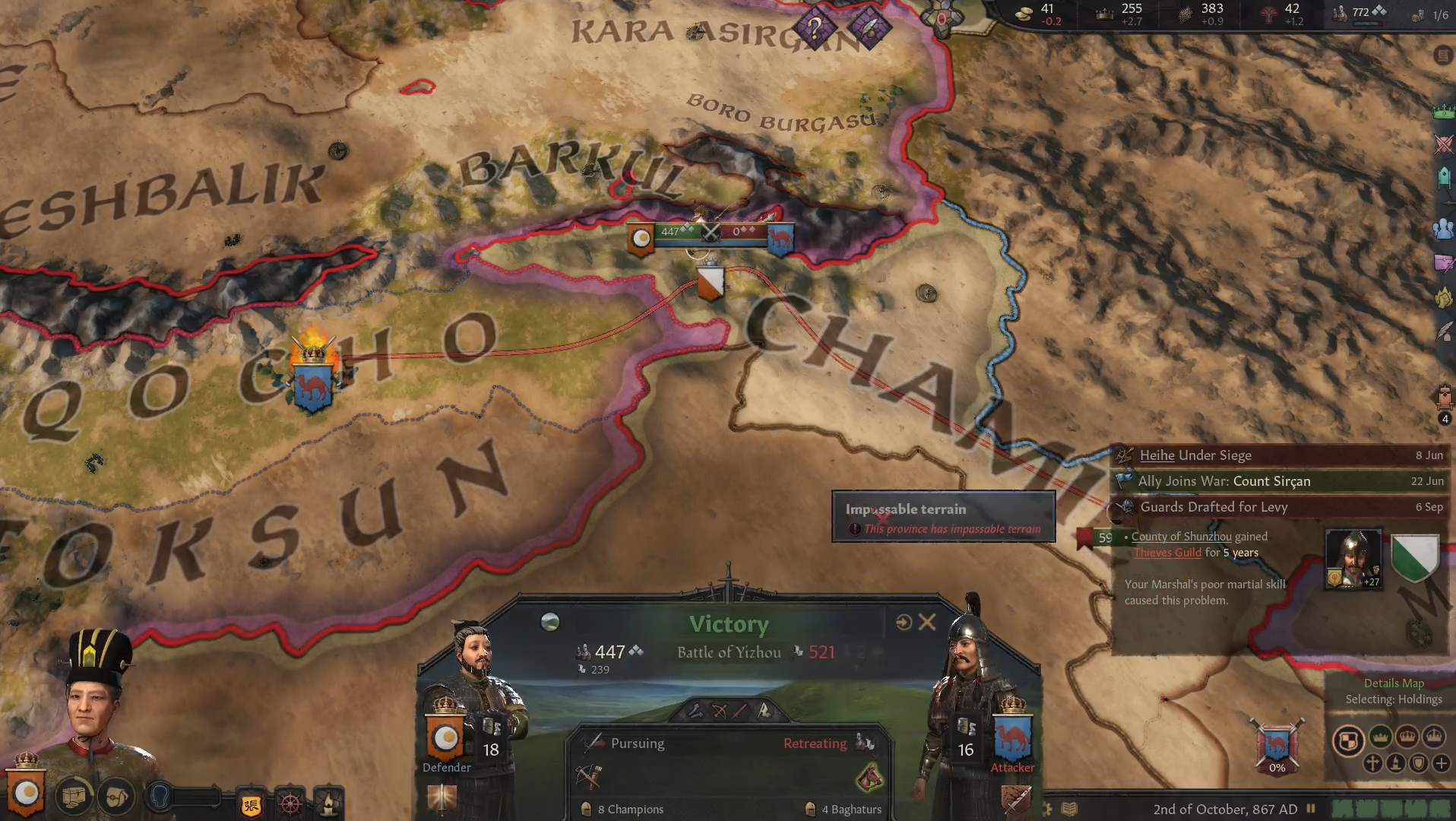While Zhang Huaishen’s heroics against the Manicheans had endeared him to many, the unsettled King knew that he would need a constant string of successes if he hoped to keep his increasingly restless vassals in line. Luckily however, the breakout of a civil war in the neighbouring Idiqut provided just such an opportunity. For context; the famous Chinese takeover of Qocho's capital had severed the Uyghurs from their southern provinces, effectively splitting the Khanate in two. Taking advantage of this situation was the colourful figure known infamously as: ‘Sagharak The Bully’, a ruthless Sogdian warlord who gained his title from his propensity to issue heavy and often informal ‘loyalty taxes’ upon his subjects, using the funds to fuel his seemingly endless desire for expensive foods and wine. Launching his rebellion at the end of the winter period in 873, there was nothing that Uyghur Khan Bokut could do to respond, short of taking back Qocho from the Chinese or scaling the tall mountains, causing much of the region to fall into Sagharak's hands.

Of course this news was a blessing for Zhang Huaishen. Despite the inept response from the Uyghurs, Saghrak’s forces were unable to successfully annex the southern most provinces, causing his rebellion to lose a large part of it’s initial momentum. With the bulk of his armies southward, his eastern territories, (particularly the strategically vulnerable Toksun), were ripe for the taking. Luckily, the death of Zhang Yichao had a negligible impact on Zhang's Righteousness Army, still bolstered by Tang soldiers and ready to perform its duty; pacification the barbarians.
Not long after Saghrak’s war in the south had even begun Zhang Huaishen struck, capturing the entire garrison at Toksun in a mere 4 months.
Despite these successes, the notoriously stubborn Saghrak refused any peace negotiations with the Zhang, ordering that all Chinese envoys be killed immediately, should they approach any of his cities or armies. Frustrated, Zhang ordered his armies to march on the warlords capital of Karashar, hoping to end the war with the Sogdian in captivity. Despite orders from Saghrak to recapture Toksun, a portion of the warlords forces would instead enter Karashar, hoping to break the siege. Whether this was due to miscommunication, battlefield confusion or simply an attempt by an ambitious general to make a name for himself is unknown, but Zhang’s army quickly dispatched the small relief force and continued their bombardment of Karashar’s walls.

Eventually Karashar was captured by Zhang’s righteousness army, and despite Saghrak’s success in recapturing Toksun, the siege had taken its toll on his forces. Deflated over this defeat and worried about his ongoing campaign to capture the south from the Uyghur remnants, Saghrak sent an envoy over to the Chinese offering a trade; Karashar for Toksun, and peace between the two kings. Achieving his stated objectives, Zhang Huaishen was ecstatic and eagerly accepted, removing his armies from the Sogdian’s capital and annexing Toksun into the greater Guiyi Circuit.
Eager to pull off an even grander spectacle for his vassals however, Zhang Huaishen immediately prepared his forces northwards to invade the battered Uyghur province of Beshabalik, held by Huaishen’s long-time nemesis; Idiqut Bokut.
In a similar manner to his previous invasion, Zhang Huaishen called upon his ally, the Turkish Buddhist Sircan, to help lend support to his invading forces. Once simply a lesser Khan among many, the fall of the Kirghiz Khanate to the Mongolians had essentially left Sircan without a patron, leaving him with a deep sense of anxiety for the future of his city-state; Agairik. With the Chinese looking to be a rising force from the East, Sircan gladly accepted Zhang’s offer, hoping that a long-lasting friendship with the Guiyi Circuit would secure his territories from any would-be invaders.
In contrast to their infamous late entry in the last conflict, Sircan coordinated closely with Zhang Huaishen, sending a considerable force of 800 to siege the new Uyghur capital of Yangjibaliq, while Zhang’s army of 1,400 assaulted Beshabalik. With the swiftness of the attack, Idiqut Bokut was barely even aware that he was at war, before troops surrounded his premises.
Surprisingly it would be Sircan who would end the war, his forces valiantly capturing Idiqut Bokut during the siege of his capital in an ironic twist on the last conflict. Whether to prove his usefulness to the Chinese, or simply as a show of force to the nations that surrounded his model province, Zhang Huaishen was certainly impressed with the wily young khan.
The two leaders were kindred spirits in a sense; each more at home dealing with coins than playing diplomat, each nominally apart of a greater empire and each largely left to fend for themselves in an unforgiving wasteland, diligently making the best of a difficult situation. Of course, neither leader could understand the other without interpreters, perhaps putting a barrier on the type of friendship that could have developed otherwise.
 I’ve been doing a Han Chinese focused Ck3 campaign with a few unique little features to keep things interesting.
I’ve been doing a Han Chinese focused Ck3 campaign with a few unique little features to keep things interesting.
































